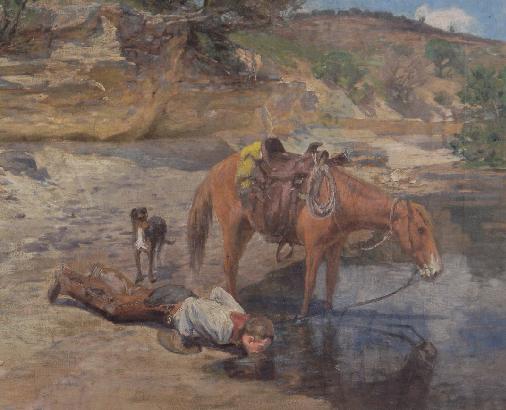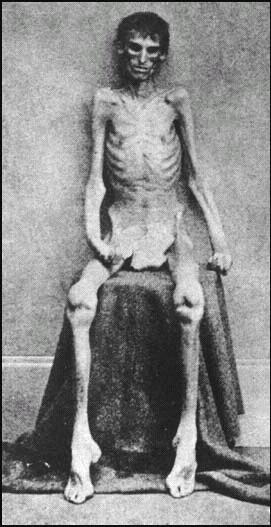- ________________________________________________________________________________________
- Last modified 03/04/08
- Copyright © by Nila Gaede 2008
| Adapted for the Internet from: Why God Doesn't Exist |
In order to understand how the upcoming economic collapse resembles the phenomenon that led to the disappearance of
the dinosaurs, I begin by asking the crucial question: ‘What things do we really need in life?’
Mahatma Ghandi reportedly answered that he could live without air or water, but not without God. Judy Garland claimed
that she could live without money, but not without love. Maslow adds sleep, homeostasis, and excretion, and the list goes
on and on. One fellow proposes that the Internet is sine qua non these days. Another says that books are absolutely
essential. And yet another says that he will die if he doesn't have a ferret. The only way I can think dying without a ferret is
if I haven't eaten for a week and the damned mink weaseled out of my oven.
So I will rephrase the question since the poet-at-heart doesn't seem to understand. What are the things we need to stay
alive?
In its description for Respiratory Therapist, the Occupational Outlook Handbook of the Bureau of Labor Statistics does not
mention God or love or any of the other metaphors the poets and philosophers brainstorm. It lists the true essentials:
" You can live without water for a few days and without food for a few weeks. But
without oxygen, you will suffer brain damage within a few minutes and die after
about 9 minutes." [1]
We certainly can live without computers as demonstrated by people in the Dark Ages, and hermits and prisoners are
good examples that we don’t really need love or friends to remain alive. Atheists also seem to get along fine without God.
Of course we need to sleep and defecate, but these are internal to the body, for free, and clearly not as fundamental as food.
Without food, we don't even have to worry about pooping. Therefore, in order to answer the question objectively, we must
eliminate abstract concepts and physiological activities. Humans can live only after they first fulfill their biological needs.
For all practical purposes, we can assume air to be unlimited. (I don’t believe anyone will corner the market on breathable
gases any time soon although I won't bet against it by holding my breath.) Potable water is a different matter. It is supplied
by the State and increasingly by private corporations which promise to make it available to all… at the right price, of course!
Although the U.N. has declared water to be a basic human right, [2] I'm sure the companies and their lawyers will one day
argue that the little old lady dehydrated because of reasons beyond their control: She forgot to pay the bill! But here I will
assume that water is also unlimited. Visualize this if you wish as a string of efficient filtering stations at the shores of every
ocean. Sweet water is available to all in the quantities they want. The only one of the three vital necessities I will deem to be
scarce is food.
Let’s say that I wave my magic wand and eliminate all that is edible on the planet. There is suddenly no more food anywhere.
How long would it take the last human to die?
My guess is that we would first engage in massive cannibalism. The history of extreme situations (Easter Island, Donner
Party, Whaleship Essex, Holodomor, etc.) [4] confirms that this is the most popular option. We will not spend time organizing
millions of starving people into collective farms or planting seeds to feed the few that might make it to harvest time. We will
spend time waiting for someone to die (or accelerating the process proactively) so that we can taste them. However, this only
postpones the day of reckoning for the human race. After a few months, this process guarantees that every member of our
species is gone. Certainly, if any women survive the upcoming catastrophe, they won't be thinking about propagating the
race. They'll be content just to live out what's left of their bleak lives.
The first issue this scenario brings up is a new mechanism for extinction. People repeatedly brainstorm the usual agents
for the possible extinction of Man – catastrophic accidents, extraterrestrial impacts or radiation, disease, nuclear weapons,
etc. – but you will never hear anyone propose that our species could massively die of starvation.
The second thing is that starvation qualifies as a selective, universal mechanism with the potential to explain a mass
extinction irrespective of epoch or habitat. If horses exclusively eat hay and hyenas exclusively eat horses, the day that
hay disappears, we should expect hay, horses, and hyenas to disappear from the record. The insects crawling under the
horses' feet would be unaffected by all the commotion upstairs. Climate and environmental change do not have this degree
of selectivity. Extraterrestrial impacts and catastrophic accidents have no intrinsic ability to discriminate at all. Therefore,
starvation is more than just a strong candidate to explain mass extinctions, and it is perplexing that paleontologists and
anthropologists never include it explicitly in their lists as a cause in its own right.
The relativistic economist points out that my proposal required a magic wand. Unlike the rest of the animal world which is at
the mercy of nature, humans control the means of production of food. We manage our own carrying capacity. We produce
as much food as we want. So what's this nonsense about massive starvation?
Here I will show that we need not resort to magic to wipe out food from the planet. I argue that Man has control over his
carrying capacity only during the demographic expansion phase of post-subsistence history. When global population
stabilizes or begins to fall, Man reverts to being just like any other species and is subject to the standard rules laid down
by Mother Nature.
| Food: Mother Nature's henchman |

| Stupid fools! The dog and the human have abundant air and water, but nothing else. I can at least eat grass and shrubs, which is all that is left. So I wonder how these two bozos plan to survive the next three days. |

- Module main page: How the last human died
Pages in this module:
- 1. This page: Food: Mother Nature's henchman
2. The definition of carrying capacity
3. Catch 22: The artificial economy is limited by population which is limited by economics
4. The economic history of Man
5. The day the global economy collapses, it will be the end of Man
6. Conclusions: Panic spreads like wildfire
| I think I'm going to have horse meat for lunch! |

| I guess I'll just have to have horse meat for lunch! |


| And above all don't forget to stock your fridge! |
